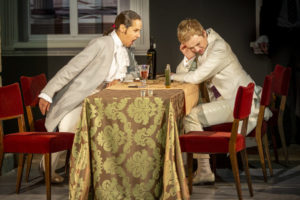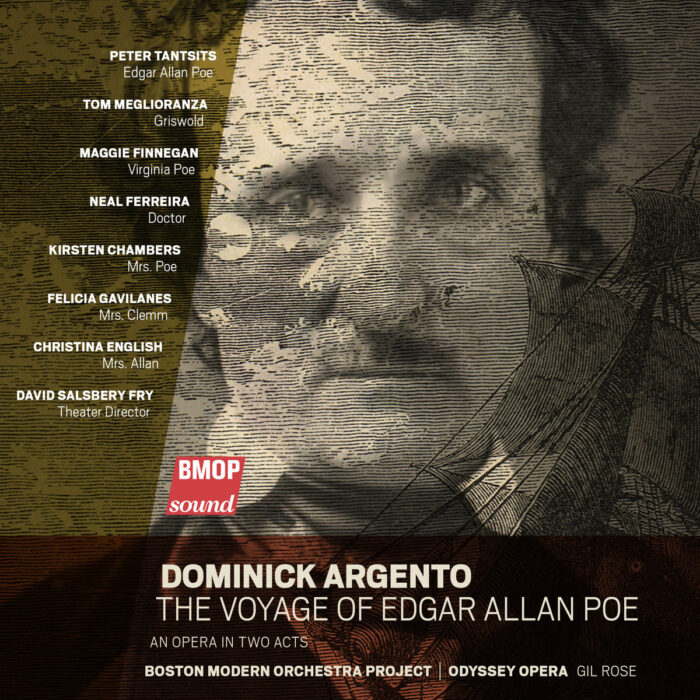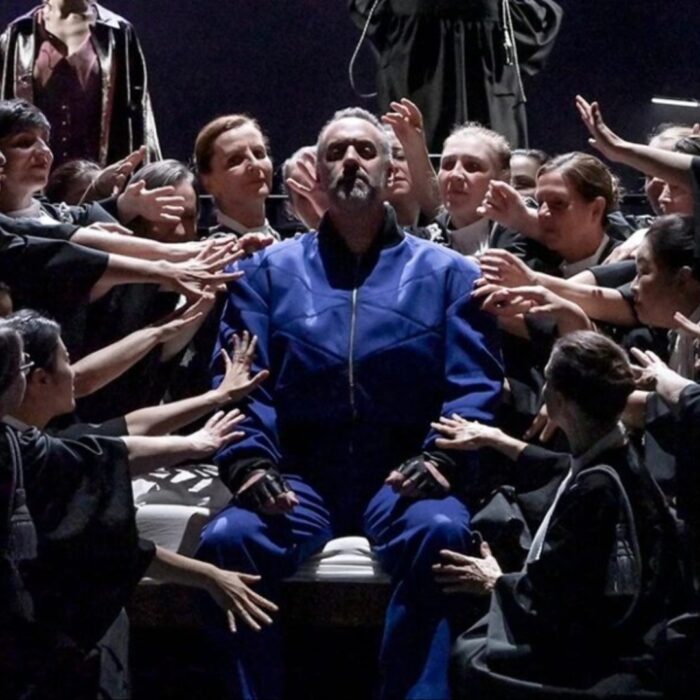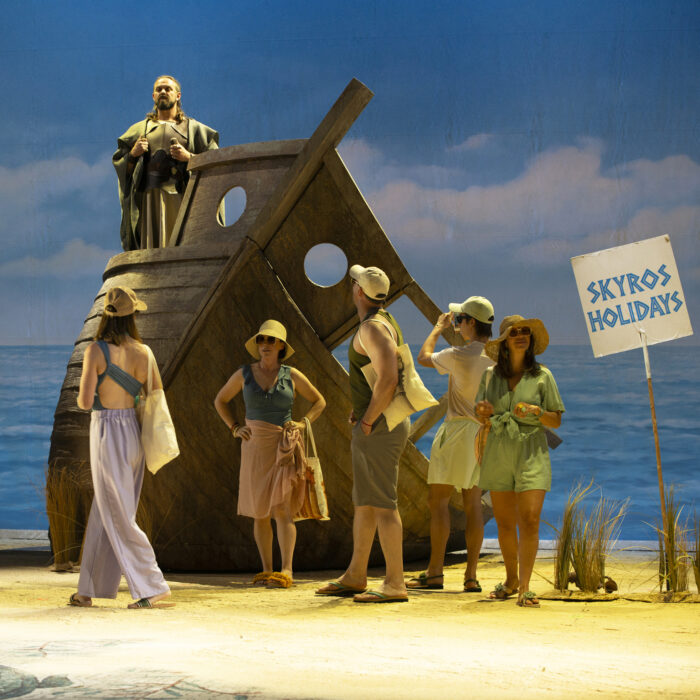
Innsbruck Early Music Festival 2019 Review: Ottone
Anna-Magdalena Fitzi Ditches Historical Context To Explore The Personal
By Alan Neilson(Photo:Rupert Larl)
Each year Innsbruck’s Early Music Festival stages a Barockoper:Jung production in the inner courtyard of the theological faculty in the city’s university, devoted to showcasing the talents of younger singers, including selected finalists from the previous year’s Cesti competition.
This year’s presentation was Handel’s 1719 opera, “Ottone.”
The libretto, by Stefano Benedetto Pallavicino and adapted by Nicola Francesco Hahm, is very loosely based on historical events, and explores the entangled relationships between its main characters against a background of dynastic marriage, empire, piracy, warfare and high politics. Its locations shift from a palace, to a coastal encampment, to gardens, to woods and even to a battlefield.
Discarding Historical Context
The director, Anna-Magdalena Fitzi, however, decided to focus solely upon the personal, and to discard the historical context. Instead she set the work in a hotel over a 24-hour period. In doing so Fitzi instates the Aristotelian unities, which had the effect of sharpening the very intense and intimate relationships between the characters as well as adding psychological depth to their portrayal.
During the overture, the characters arrive one by one with their suitcases, including their psychological baggage. Over the course of the 24-hour period we watch as they confront their inner selves, triggered by their interactions with each other: so it is, for example, that Gismonda’s manipulation of her son precipitates conflict between Matilda, Ottone, Teofane, and significantly within herself.
As the psychological fall out rises, so their behavior becomes more extreme with murder very much in mind. Pushing them together in a hotel was a successful and clever idea as the they were unable to escape from each other; they were confronted with their problems in the most direct way, the pressures were ever present and everything took place in full view of the others – there is always someone sitting around the lobby area or looking in from a window! It was a pressure cooker environment, which had it been left unattended would have inevitably exploded.
Fortunately, just before check-out, Teofane, very much the outsider, sits them down together, counsels reflection, and offers hope.
A further benefit of Fitzi’s staging was that it dealt with the problem of the da capo aria, which if not handled well, can destroy the forward dynamic of the drama and undermine its dramatic tension. Not so here, because the singer was nearly always being observed by someone, even if only a semi-disinterested barman, so that there was always an active context in which the da capo was set; the drama did not stop for the singer to idealize an emotion, and consequently possessed an engaging momentum, and was never static.
The scenery was designed by Bettina Munzer, for a staging in the courtyard of the Theology Faculty, which incorporated the buildings themselves. Unfortunately, because rain had been forecast, the performance was moved inside, into the Haus der Musik, which was not the preferred location. Nevertheless, the simple staging consisting of a simple flat wall with windows, and props suggesting a typical hotel foyer, with a lobby and bar areas, proved to be an adequate setting. Costumes were largely based on 18th century designs, which contrasted with the modern hotel to give the work a timeless dimension.
Not So Comfortable
On the musical side, things were not so comfortable. The singers, almost without exception, were slow to fully engage with their roles. They were reticent and too conservative, with the result that arias, which have been singled out by many commentators over the years for their expressive melodies, were fairly bland affairs, and slid by with little impact. Although there were occasional flashes of interest in the first act, it was not until Act two that the performance really ignited and the singers started to show their the true talent. Maybe, having to adjust to the new venue unsettled a few nerves.
The most noticeable change came from mezzo-soprano Marie Seidler, playing the role of Ottone. Her performance in the first act was somewhat lackluste, but who in the second act was like a completely different singer. Her overly cautious approach disappeared, and she produced a vibrant, energetic and expressive presentation.
The voice was projected with greater surety, there was greater variety of colors added to her singing, the vocal lines were delivered with greater degree of expressivity and her coloratura blossomed. Ottone became a real character, far removed from the pale facsimile of Act one.
Teofane moved through the opera more as an outside observer than an active participant, carefully watching the behavior of the other guests at the hotel, although she herself is subjected to certain emotional stresses.
The role was played by soprano Mariamielle Lamagat, who although inconsistent in the first act, produced an impressive account of the aria, “Falsa immagini e, m’ingannasti.” Over thin orchestral accompaniment she gives voice to her confusion and disappointment on meeting Adelberto, whom she believes to be Ottone, and has agreed to marry. It is an aria in which the voice is exposed, but Lamagat showed ability and confidence, producing an expressive reading in which she not only successfully carried the melody and interacted with the orchestra, but was able to show off the beauty of her voice. Her instrument has a bright, enticing upper register, as well as the ability in crafting intelligent phrases. However, there was a tendency to clip the end of lines on occasions.
Later, on discovering Adelberto’s deception, Lamagat displayed a more forceful and passionate side to her singing. During the second act she moved up a gear, and displayed a greater consistency, in which she gave further evidence of the versatility of her voice, its attractive timbre, and ability to inform the vocal line with emotional depth.
The mezzo-soprano, Valentina Stadler, in the role of Gismonda sang the work’s first aria, “Pur che regni il figlio amato,” in what was an acceptable, if somewhat perfunctory rendition. Certainly, it did nothing to suggest the quality she was to inject into her singing as the evening developed.
Gismonda is a multi-layered character who is obsessed with the crown and ambitions for her son, yet she is also capable of feeling grief and sorrow, characteristics which Stadler successfully uncovered. Towards the end of Act one she sings the aria, “Vieni, o figlio, e mi consola,” in which she gives voice to the heartfelt sorrow she feels for her son, who has been imprisoned. Wrapping her words with emotional force, Stadler captured a mother’s pain and grief for a son who is suffering.
Later, in a celebratory mood, she confronts Ottone and brags about Adelberto’s escape in her aria, “Trema, tiranno, ancor,” inflecting her voice with a wonderful array of dynamic and dramatic accents. Moreover, Stadler also displayed skill in delivering recitatives, which were sung with intelligence and imbued with meaning, and supported by her excellent articulation. By the end of the evening, it would be fair to say that she had overcome her early shortcomings, and produced the standout performance of the evening.
Neat & Tidy
The countertenor, Alberto Miguelez Rouco, generally, gave a neat and tidy performance in the role of Adelberto. His voice is fairly monochromatic, but he was able to inject flashes of color to provide contrast and depth. His phrasing was carefully developed, displaying delicacy and accuracy, although to an extent this tended to be at the expense of expressivity, never appearing to attempt embellishment or vocal inflections that strayed too far outside his comfort zone. Nevertheless it was a solid performance, and suggestive of more to come.
Matilda is a character who rages one way then the other. It fell to the mezzo-soprano Angelica Monje Torrez to play the role. Hers is a voice perfectly made for such roles, as it is awash with color with a dark sultry underside. Once into her stride she sang with freedom and expressivity and convincingly gave voice to her strong and changing emotional state.
Her duet with Gismonda, “Notte cara! a te si deve,” in which they celebrate Adelberto’s escape from prison, was beautifully drawn. Torrez’s darker voice proved a delightful contrast to Stadler’s brighter timbre, with both voices evincing an impressive plasticity.
Alone among the singers, Yannick Debus, essaying the role of Emireno, delievered the most consistent performance of the evening. He has a strong stage presence and is a good actor. A few days earlier, he had appeared in the final of this year’s Cesti competition, and gave a solid if not particularly notable account.
In character, however, he is a different animal. He was more relaxed and sang with far more freedom, to which he brought a greater depth of expression. He possesses an attractive baritone, which he employs with skill and versatility. His articulation and attention to the meaning of the text were excellent. However, playing his physical fight with Adelberto for laughs did not work, grating against the serious psychological interpretation of the production.
The orchestra would have been on the stage at the original venue, but in the Haus der Music they were positioned in front, and to one side of the stage, which no doubt restricted its planned interaction with the cast. Under the conductor, Fabrizio Ventura, the Accademia La Chimera produced a versatile and lively performance which captured the expressive quality of the score.
Overall, this was an interesting and largely successful presentation, in which Fitzi succeeded in exploring the underlying psychological drivers of the characters.
Although the performances of the singers initially lacked focus and frisson, once into their stride they displayed real talent and essayed the roles with skill, and validated the decision by the Innsbruck Early Music Festival to stage an opera aimed at giving young singers the chance to sing major roles at a prestigious festival.



